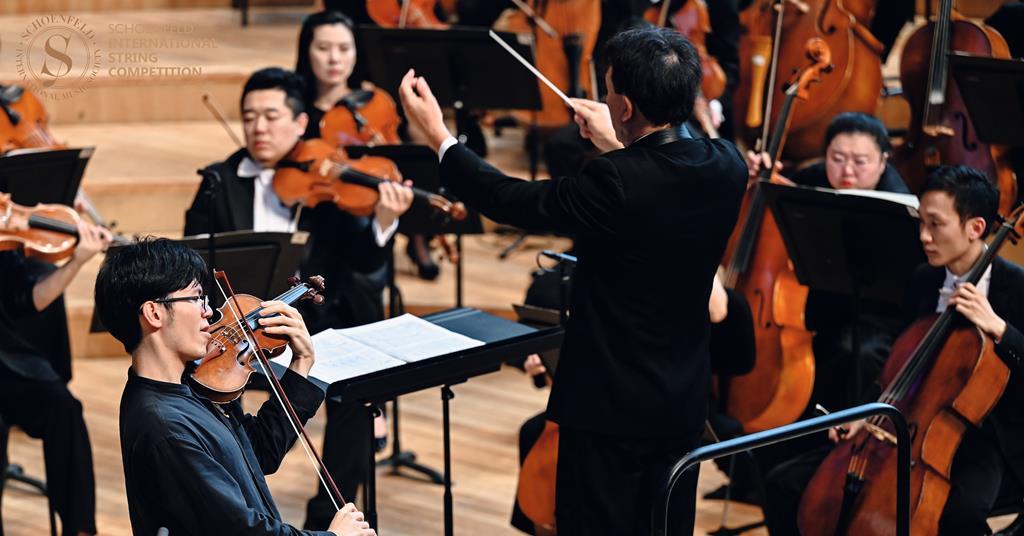Discover more Featured Stories like this in The Strad Playing Hub
On 25 July 2025, the 6th Schoenfeld International String Competition officially concluded in Harbin with a spectacular closing concert and award ceremony. After ten days of intense and exciting competition, 103 candidates from 22 countries displayed their best talent in this musical extravaganza.
Beyond the intense competition, a series of diverse activities were also curated in the Schoenfeld this year, including commissioned Chinese works, jury recital series, masterclasses of jury chairs, and community outreach events. These activities promoted the educational philosophy of the Schoenfeld sisters, Alice and Eleonore, in Harbin and China, to attract enthusiastic attention to classical music from across China and around the world.
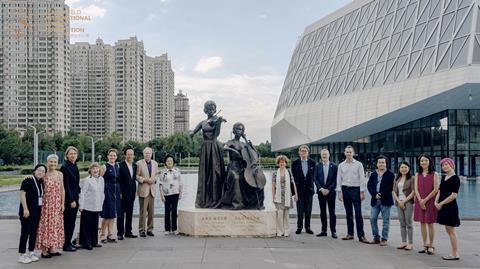
This year’s competition jury was chaired by Augustin Dumay and Arto Noras, and comprised Sergey Antonov, Anne Gastinel, Xenia Jankovic, Natalia Pavlutskaya, Pinfei Tang, Alasdair Tait, James Cuddeford, Roman Kim, Jennifer Koh, Vineta Sareika, Tianwa Yang, Lina Yu, with Wei He and Li Sheng serving as the distinguished artist panel.
At the closing and award ceremony on 25 July, Florian Riem, secretary general of the World Federation of International Music Competitions, gave a speech: ’Tonight, as we celebrate outstanding young artists, we also celebrate the city of Harbin, a city with multiple cultural origins, influences, and a fascinating history.
’Its sheer diversity, plurality, and cultural richness make it a true city of music, and no one else could be a better icon, could be more symbolic for it, than the two sisters Alice and Eleonore Schoenfeld. Born in Yugoslavia to Ukrainian and Polish parents, the sisters grew up in Germany, pursued their careers in America, and developed a strong affinity for China, which has helped launch the careers of numerous young artists.’
Winners announced after a fierce competition
The competition was divided into three divisions: violin, cello, and chamber music. Following pre-selection of hundreds of applications from all over the world, 35 violinists, 35 cellists, and 33 chamber musicians were shortlisted and advanced to the on-site competition in Harbin.
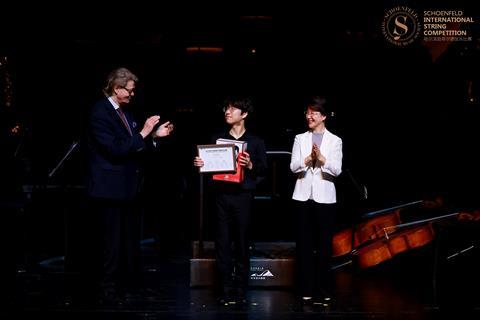
In the violin division, Chinese violinist Meng Zou won the gold medal with his brilliant performance of Sibelius’ Violin Concerto in D Minor. Chinese violinist Bo Cui and American violinist Audrey Park won silver and bronze medals respectively.
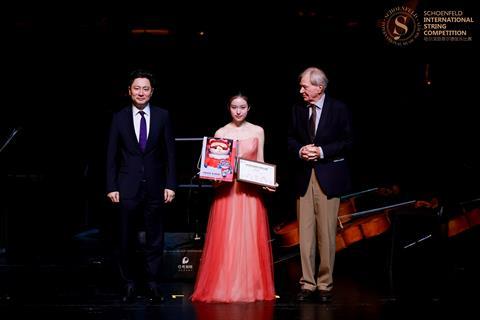
In the cello division, 15-year-old South Korean cellist Jeri Lee won the gold medal with a Romantic interpretation of Tchaikovsky’s Variations on a Rococo Theme.
After winning the award, she shared the reason for choosing the piece: ’I pay more attention to presenting the singing expression in the music, so I chose this piece that can fully display the timbre of this instrument. This stems from my persistence in personal musical philosophy rather than simply pursuing an advantage in the competition.’
She shared some insights on the competition, saying: ’What stayed with me most about the Schoenfeld Competition was how deeply it trusted its participants—not just as musicians, but as people. That sense of trust shaped everything: the atmosphere, the performances, and how we were heard.
’Winning first prize was a great honour, but what has stayed with me even more was the feeling that my music had truly reached someone—both the jury and the audience. This experience reaffirms my belief that I am on the right path as an artist.’
’This experience reaffirms my belief that I am on the right path as an artist’ – Jeri Lee
The jury chair of the violin division, Augustine Dumay, who also judged the finals of the cello division, commented on Jeri’s performance as ’not bound by technical constraints, allowing rich imagination to run naturally and freely.’
The New Zealand cellist Matthias Balzat and the Russian cellist Bogdan Efremov won the silver and bronze medals respectively in the cello division.
In the chamber music division, Trio Archai won the gold medal and the award for the ’Best Performance of Beethoven’s Work.’ Berlinsky Quartet won the silver medal, and Mila Quartet from Tianjin Juilliard School won the bronze medal. The Trio Havisham and the Trio Azura ranked fourth and fifth, respectively.
The members of the Trio Archai said, ’Winning the Schoenfeld Competition is of great significance to us and gives us confidence; it allows us to continue our career as a chamber music ensemble.
’We regard this honour as an opportunity to reach new audiences in China and other regions, and we are also very much looking forward to returning to China again to share our love for chamber music with more people.’
Jury of the competition, and artistic role models for the young musicians
During the competition, the jury also shone brightly on the musical stages in Harbin. On 19 July, judge Vineta Sareika performed violin works by Brahms and Clara Schumann in the Chamber Music Hall of Harbin Concert Hall. Xenia Jankovic interpreted the classic cello masterpieces of Schumann, Debussy, and Stravinsky. Roman Kim performed violin works by Tartini, Chausson, and Paganini with a dazzling tone, as well as two romances he composed himself.
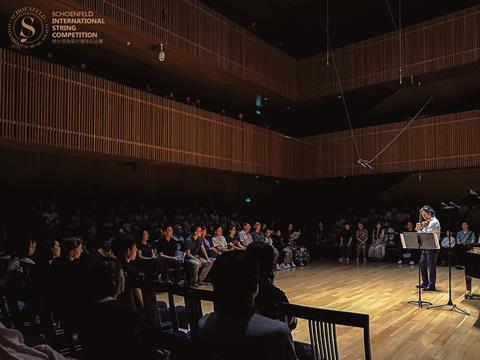
The jury performances drew a large audience, including many competition candidates. The artistry of the competition jury panel and the profound artistic attainments were reflected in the music they performed, and on 24 July, chairs of the jury, Arto Noras and Augustin Dumay, respectively, gave masterclasses on cello and violin at the Harbin Old Synagogue Hall.
Noras sincerely shared his feelings as a jury leader: ’I would like to sincerely thank the organisers, relevant parties, and everyone who has made efforts to make this competition happen.” It is precisely because of everyone’s selfless dedication and unremitting persistence that this top-notch music event was successfully held on this beautiful land of Harbin, allowing talented artists to showcase their talents, satisfying the people who love culture and music, and also enabling beautiful music to be spread more widely.’
He also hopes that the candidates can carry the spirit and enthusiasm they demonstrated in the competition to the world during his sharing in the closing ceremony:
’I would like to congratulate you [the candidates and winners] on your great success. You are all winners. I hope, and as a pedagogue, I know that the huge number of hours you have spent in preparing the demanding programme of the competition has helped you to reach a higher level as a musician.
’I wish you all the best for your future and I hope that you continue you’re playing with the same musical dedication and flame you have shown for us during this competition.’
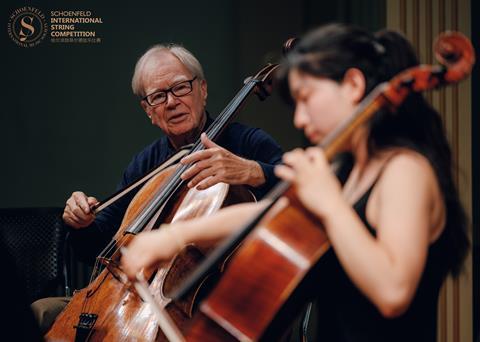
When Augustin Dumay talked about the overall performance of the candidates, he believed that the competition will have a positive impact on their careers. He has very high expectations for their future development: ’I have always believed that no matter what competition the candidates win or what they do next, as musicians, they should find their own characteristics.’
It is necessary for candidates to clearly understand what personal characteristics are presented to the audience on the stage and what features of the musical works are to be performed. In his view, the classical music industry always looks forward to voices with unique personalities and profound insights.
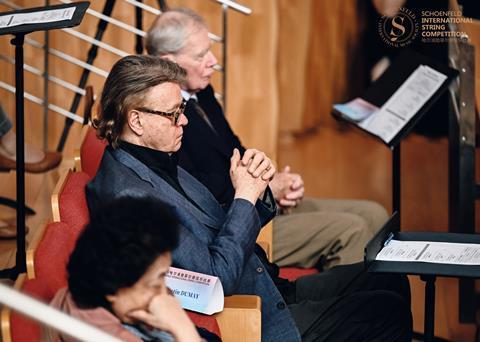
The Chinese jury also demonstrated the Chinese leading force of string playing. On 24 July, Tianwa Yang, a Chinese jury member who has been based in Germany, held a solo concert at the Harbin Old Synagogue Hall, after the jury chair’s masterclasses.
She performed the pieces of Ysaÿe, Bach and Widmann with her peak techniques and control; when interpreting works by Bach, she used baroque bows to restore the charm of ancient musical voice; and in the second half of the concert she presented the audience with the avant-garde expression of the violin through Widmann’s music by singing and harmonising her voice with the sound of the violin. As a benchmark musician of China who has shone brightly on the international stage, her appearance undoubtedly highlights the dazzling charm of Chinese classical music talents.
The Schoenfeld International String Competition is the first and only string competition member in the World Federation of International Music Competitions (WFIMC) that sets up a chamber music division. It inherits the artistic concept of the Schoenfeld sisters, who advocated for chamber music.
Distinguished artistic panel Li Sheng, who was invited to judge the chamber music division, believes that this competition has made significant contributions to promoting the development of Chinese string education. Another jury member, Lina Yu said with satisfaction, ’I am deeply proud to see that young Chinese musicians have formed an overall strength to win the world’s most important music competition.’
Distinguished artistic panel member Wei He believes that this competition provides a platform for young chamber music talents around the world to showcase their talents and exchange and learn from each other.
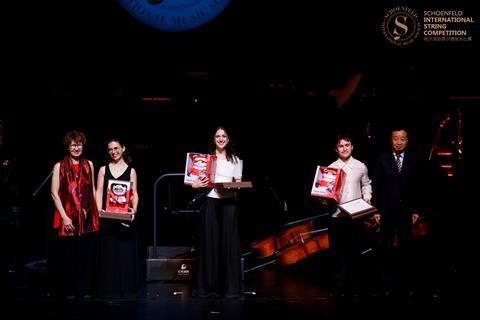
This competition not only brought classic interpretations of Western classical music but also enabled the original works of Chinese composers to be heard more widely on the international stage. The new Chinese works commissioned by the competition – Chengqian Xue’s violin piece The Song of Yimeng and Bin Zhu’s cello piece Ningjibula – were performed as compulsory pieces for the competition and were exquisitely presented by the world’s top young string artists.
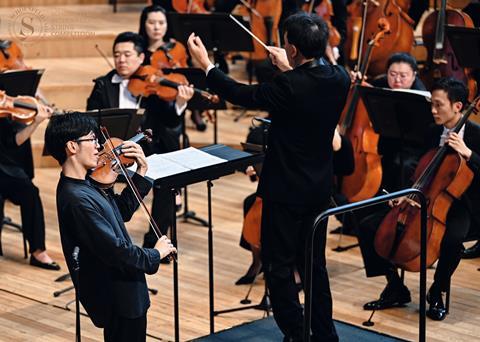
Among them, the Best Chinese Work Performance Award for violin was won by the silver medalist and Chinese violinist Bo Cui, and the Best Chinese Work Performance Award for cello went to Chinese semi-finalist cellist Runing Li. The passionate performances of the two at the closing ceremony, which was accompanied by the Harbin Symphony Orchestra, brought the characteristic heritage of Chinese music and its diversity on this international platform.
Roman Kim was amazed by the performance of the Chinese violinist, who ’had a profound and powerful quality, demonstrated a resonance with the philosophical thoughts of both the East and the West.’ Jury member of the cello division Anne Gastinel was deeply impressed by Runing Li’s interpretation of Ningjibula, believing that her performance contained an emotional depth beyond her age and a profound understanding of the work, which made her feel the extraordinary nature of Chinese music culture.
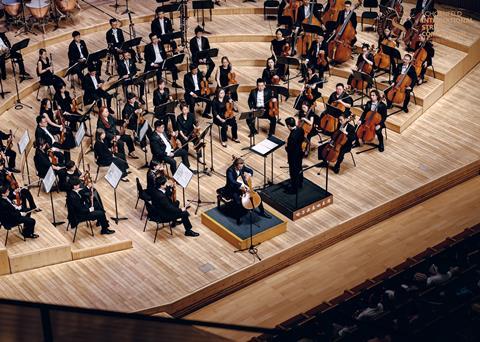
The Harbin Symphony Orchestra, conducted by Jindong Cai, accompanied the finalists of the violin and cello divisions and the closing ceremony. Cai highly recognised the value and level of this competition: ’Chinese classical music has demonstrated unique vitality on the basis of integrating Western traditions and Chinese culture and has been continuously growing through international exchanges. Harbin’s Schoenfeld International String Competition is a perfect example.’
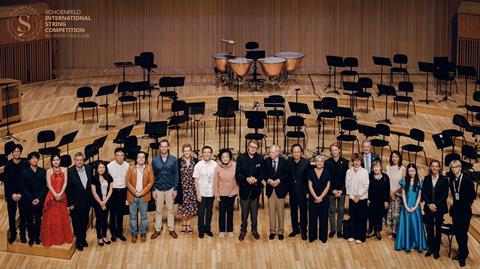
The Schoenfeld’s International String Competition’s inspirations to connect different parts of the world
The Schoenfeld International String Competition acts like a bridge connecting Eastern and Western cultures, and it is even more closely linked to the past and future of Harbin. The development of the Schoenfeld attests to the transformation of the nation and encourages its stronger connection with the global musical landscape.
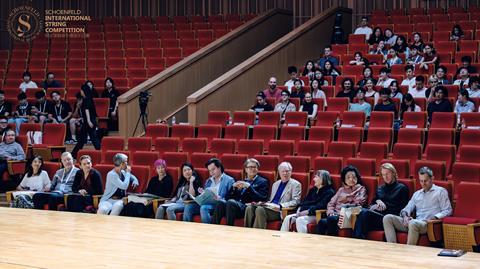
Suli Xue, president and artistic director of the Schoenfeld International String Competition, looks forward with great anticipation: ’We aim to turn the competition into a high-quality platform for dialogue between Eastern and Western musical civilisations and continuously promote Chinese works to the world.’
’In the future, this competition should not only be ”Harbin’s Schoenfeld,” but also “the Schoenfeld’s Harbin,” and allow more music lovers, young talents, and world-class musicians from all over the world to know and experience Harbin through the event. They can get to know, understand, and fall in love with this city, and use the composition as an engine to promote the culture and musical mission of the city.’
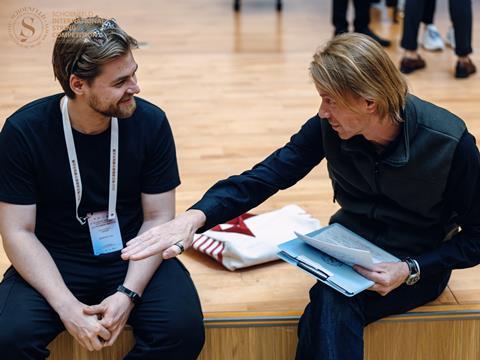
Harbin Modern Culture and Tourism Investment Group Co., Ltd. was the sponsor partner of the 6th Schoenfeld International String Competition. After each round of the competition, there were feedback sessions for the jury to exchange their views with the candidates and give them encouragement and development suggestions. The candidates also tasted the Harbin Modern ice cream (also known as Madieer ice cream, which is a popular and iconic treat in Harbin, China). In this edition, the Schoenfeld successfully combined with Harbin’s culture, art, and tourism. The Harbin Municipal Bureau of Culture, Radio, Film, and Tourism presented every candidate with characteristic souvenirs, giving them a unique memento from Harbin.
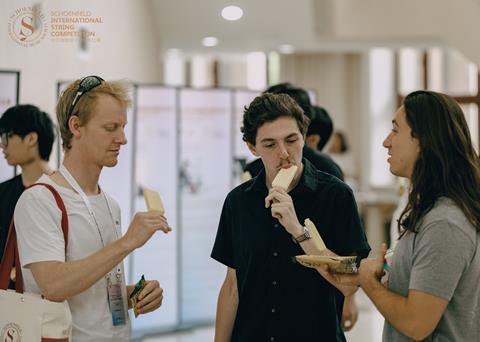
As a city with a century-old musical tradition, Harbin has witnessed the early integration of Western music and Chinese culture. The sound of the Russian bayan on Central Street and the reverberation of music in the Old Synagogue Hall have long planted the genes for the ’City of Music.’
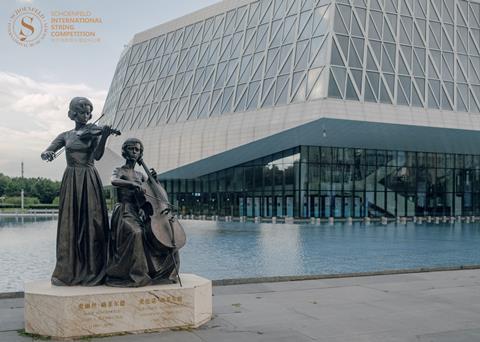
The continuation of the Schoenfeld International String Competition not only carries forward this cultural heritage but also injects new vitality into the city with international and cutting-edge artistic perspectives. Young musical talents draw nourishment for growth here, and the understanding of classical music among the citizens grows as well through the diversified and high-level performance activities of the competition, making the ’City of Music’ brand shine even brighter in the new era.
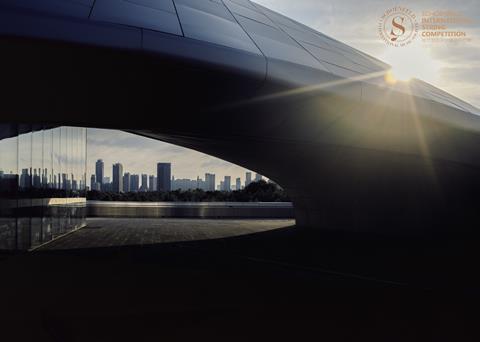
All images courtesy Schoenfeld International String Competition.

In The Best of Technique you’ll discover the top playing tips of the world’s leading string players and teachers. It’s packed full of exercises for students, plus examples from the standard repertoire to show you how to integrate the technique into your playing.

In the second volume of The Strad’s Masterclass series, soloists including James Ehnes, Jennifer Koh, Philippe Graffin, Daniel Hope and Arabella Steinbacher give their thoughts on some of the greatest works in the string repertoire. Each has annotated the sheet music with their own bowings, fingerings and comments.

The Canada Council of the Arts’ Musical Instrument Bank is 40 years old in 2025. This year’s calendar celebrates some its treasures, including four instruments by Antonio Stradivari and priceless works by Montagnana, Gagliano, Pressenda and David Tecchler.
